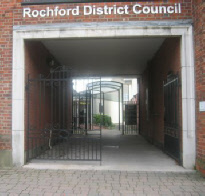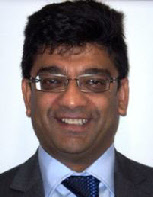


Rochford District Council

Talking with Amar Dave, the new Chief Executive of Rochford District Council
We won’t call this an interview because if it was, I suspect I was the one being interviewed. The purpose of these articles of Rochford Life is supposed to be to reveal the person and the work of (in this case) the Council. You will get that with this encounter, but perhaps in a very indirect but equally valuable way (I hope). This ‘conversation’ ran on for an hour and three quarters and it is very difficult to either precis it or decide what bits to include or omit. To recount every word would, I am sure, have you stop reading long before the end. Because Amar has only just taken over there is, therefore, little about the Council as such but what you have here are glimpses into the new mind at the head of the team in South Street. I have taken out of this my parts of the discussion but I hope from what is left, you will be challenged (as I was!!!!) to think afresh about our local community.
Rochford Life: Amar, thank you for your time. Talking to Paul just now he said you were enjoying yourself here?
Amar: Oh I am. It’s really lovely being here. Rochford is really lovely, if you look at the authority, nice people who genuinely want to do the best for the community. We had a meeting with businesses yesterday; they really care. The elected members have come because they want to make a difference, they are positive and they really care, and the team, care. When you have all that then there is no downside. Paul has been brilliant in the handover.
RL: Your bio says you have been Acting Corporate Director of Environment, Culture and Transport at Reading Borough Council since 2010 and prior to that been with Stroud District Council and Amey Facilities Management. What actually is your background?
Amar: Leisure, sports, facilities, contracts. That was a great start because my view is that breadth of knowledge helps later on. It’s really about the feeling you get at an early stage that really matters. For me, I keep saying, people really matter. The thing that really matters for people, regardless of whatever industry you are in, is confidence. From the Council’s perspective on the residents, most people want to feel safe inside and outside their homes, they want to move to an area where they can bring up their kids, grow old and so on. For people to feel safe in a world where brand is important, values are important. It’s the EVR model: environment, values and resources. When the three are in place it’s a really good brand. If values are adrift it then becomes competence and conscience – you know when you’re doing wrong. Organisations know when they are doing wrong and if everybody isn’t keeping to the values it really does matter! People need to feel confident in them.
RL: So what values are you bringing in to the local authority?
Amar: I think there are good values here already. Paul has instilled them, and there is a really good team here. And of course they have made so many of the critical decisions already, looking at housing and leisure and so many other things. And so now it’s about, what is needed next? What innovation is possible to take us on?
RL: It is often said that the private sector is more creative than the public sector, but you are implying creativity and innovation.
Amar: I think the Council has been creative, for instance in the way the deficit that has been managed. It’s not always about creativity though. If you measure trust and value, banking, (in the private sector) is probably not has high up as a local authority (in the public sector). Councillors are now relatively high on the list. Those who engage with the councillors would put them right up there. But private sector isn’t doing well. Yesterday Lloyds Bank were being fined for wrong practices. I can’t remember the last time when the police (public sector) lost a prisoner but yesterday two private sector contractors lost their contracts for failures in tagging and so on. When you start analysing it and taking the evidence, and if you ask questions around value and around trust, local government would be high up, People ask how their money is spent, but the information is there for them if they want it – but it’s probably not when you think of the private sector.
RL: So what are the crucial questions as far as you are concerned here?
Amar: The crucial question has to be why are local authorities here? The answer has to be to serve the public and deliver a better quality of life for the longest time period. To see what would happen if it didn’t do that, think back. The local authorities came about because the sewage issues in Manchester meant people were dying early. We want people to live longer because that is the right thing to do. Then it was about getting people from A to B and the car, then it was about sanitary conditions and the state of homes, then to overcrowding so housing provision, then we want parks to make life more enjoyable and a break from work. All those valid reasons can be summarised as making sure you are safe in your home, because that is what the public sector is here for. When you come out of your home and feel there is something better possible out there, the public sector is there to respond to that.
RL: How do you respond to the idea that when it comes to the Council, people take it for granted and so ‘don’t know and don’t care’?
Amar: Well perhaps the reason for that is that basically the Council works, we pick
your bins up and we cut the verges and so on – and it works. What we’ve got to get
better at as an organisation is to go that extra mile and really explain to people,
our customers, what we do so that when they ask a question, in the answer they know
there is a rational reason for decisions we make and the things we do, and it’s not
always that we just haven’t got the money. It is often, does it make sense when you
go through it and does it make sense to you personally. We speak about that average
figure of £205 that we get in Council Tax on Band-
RL: What do you see as the primary challenges facing you here in the next five years?
Amar: It’s too easy to say it is the financials because they aren’t the issues for us. The issue for us is for us to have a strategy to deliver what is important and how can we make that happen? Choices come after ‘what is the vision for Rochford?’ What is the vision and how then do we make that happen? That is the challenge. The challenge isn’t to manage the budget because that is the wrong way round, because what you end up saying is, “I’ve got £10, how can I spend it?” What we should be saying is, “This is what we want and it costs £100. How do I go and find that £100?” It’s that ‘reverse engineering’ we need to get into. It’s too easy to say we haven’t enough money – who has?
RL: And so?
Amar: It’s not just about financial wealth. For instance we have Terry, Keith, Simon – they’re worth their weight in gold. Is it about the wealth or is it about the values we were talking about earlier that I want, irrespective of how much money I’ve got – I want to participate in the community. Wouldn’t it be brilliant with the people in Rochford if we say, take the experience you have from your previous years, how can that be used in the life of the community, in the things we do for the community? It may be we also have people with a shed load of personal wealth – would they like to sponsor a community centre or whatever else it is that is needed? Suppose we have a retired teacher – we know that we have unemployed people, or young people who need mentoring who they could help. All of a sudden we are in a very different place with a very different community.
RL: And so?
Amar: The question then becomes, how do we get those people? How do we communicate
with them to come along and get involved? Are they on Twitter, do they look at e-
RL: Suppose they say, why bother?
Amar: The reason for bothering is the skill sets you might have available. If you look at the community, we ask what really matters to you in this community? Answers may be, we want children to be highly educated, we want young people to have jobs, we want people to stay locally and enjoy the community that they’re in, we’d like to feel fulfilled in putting something back into the community.
RL: Doesn’t it need a local authority motivation?
Amar: No, I don’t think so. One person could recruit two people who could each recruit two people and they could meet on the front room of one of them or in a local community centre and say, what are we going to do for this community next week or next month or in six month’s time, and it could be from planting bulbs or to doing something about young people hanging around, say. Rather than worrying about budgets it becomes how do we help and change the community? When we’ve started, we ask how can we build on this or that? What we may find is that we feel there needs to be a bigger funding for something and the task then becomes for the organisation, somebody in the team we’ve got now, who is going to go out and bid for grants, particularly in the areas we’ve kicked off. We then go to the MP and say this is your area and look what a fantastic job has been started with this and this but the funds aren’t in place, so they go off on our behalf. The role of the local authority is still to collect the bins, still to make sure the verges are cut, but in addition there can be so much more.
RL: Isn’t the truth that many people ‘out there’ don’t feel empowered and so it needs the local authority, who rightly have a finger in this and a finger in that, to start the ball rolling?
Amar: Let’s reverse engineer that. How do we get them to feel empowered? If someone has an idea about a project say, give me a ring and we’ll ask with them, how are we going to make this happen?
RL: OK, I’ll stop the article so that it doesn’t get diluted. Thank you for this somewhat unusual ‘interview’. We’ll see what comes out of it. I look forward to watching this space!